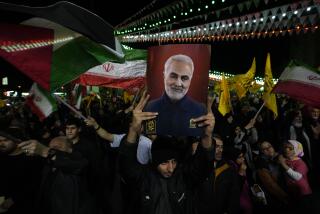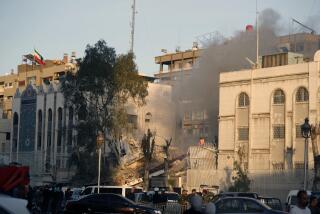EU imposes new sanctions on Iran, Syria
The European Union accused an elite branch of Iran’s Revolutionary Guard of giving supplies and other support to Syria to help crush a popular uprising against President Bashar Assad’s autocratic government.
The EU banned European travel by the Quds Force, as well as by 15 Syrian officials and four branches of Syria’s intelligence services, and froze their assets in sanctions adopted Tuesday and made public Wednesday.
The Quds Force “has provided technical assistance, equipment and support to the Syrian security services to repress civilian protest movements,” the EU alleged.
Syrian forces have escalated their five-month military offensive against government critics despite condemnation from Western and Arab nations. On Wednesday, Syrian tanks and forces stormed two towns near the border with Iraq and killed at least seven people nationwide, according to opposition groups.
Western and Arab diplomats have spoken privately of accusations that Iran, which used force to quell its own protests after the disputed 2009 presidential election, was lending its expertise and men to Assad as he struggles to keep his government from being the latest to fall in the recent Arab uprisings.
International authorities have not yet made public their evidence, however, and the EU sanctions announced Wednesday gave none. British and other newspapers have cited anonymous diplomatic accounts of bearded men speaking Iran’s Persian language among Syrian forces.
The Quds Force is one of the main branches of Iran’s covert operations abroad, according to the U.S. Defense Intelligence Agency and others. International intelligence officials suspect it of delivering weapons to Lebanon’s Hezbollah movement and to other allies of Iran.
In Iran, one political scientist charged that the EU was trying to exacerbate already-acute fears in the Arab world that Iran was aggressively trying to preserve and expand its regional influence.
“It is a message to Qatar to send more money to the opposition in Syria to buy arms and fight the Syrian regime. It will be an encouraging message to Salafi Sunni [fundamentalists] in Syria to push for toppling the Syrian regime,” said Ahmad Bakhshayesh-Ardestani, a professor in Tehran.
At a minimum, the EU sanctions were a message to Syrians that regardless of whether Assad’s regime survives, “your country’s ties with Iran should be severed,” said Mashallah Shamsulvaezin, another political analyst in Tehran.
In June, an earlier slate of EU sanctions over Syria’s crackdown named three commanders in Iran’s Revolutionary Guards. Iran, which called those sanctions “baseless,” made no immediate public comment Wednesday.
Among the targets of the latest sanctions is Ali Douba, a former head of Syria’s military intelligence. The list cites Douba as a principal in the Syrian government’s deadly 1980 crackdown in the central city of Hama, and says Assad recalled Douba to duty to help with the current crackdown.
With no international military intervention in Syria under consideration, Europeans and Americans are working to strengthen economic sanctions against the regime. The measures are meant to force an end to Syrian attacks that the United Nations says have claimed at least 2,200 lives since March.
European and U.S. diplomats at the U.N. on Wednesday circulated a draft resolution for an arms embargo on Syria. European diplomats also are expected to push for adoption of a European embargo on Syrian oil by next week.
In Syria, activists still see hitting the privileged business community as their best hope for forcing change, one said. “We know that harming the economy will bring the regime to its knees,” Wissam Nabhan, a laborer and an opposition activist, said by telephone from the western city of Idlib.
Knickmeyer in Beirut and Mostaghim in Tehran are special correspondents. Special correspondent Roula Hajjar in Beirut contributed to this report.
More to Read
Start your day right
Sign up for Essential California for news, features and recommendations from the L.A. Times and beyond in your inbox six days a week.
You may occasionally receive promotional content from the Los Angeles Times.






